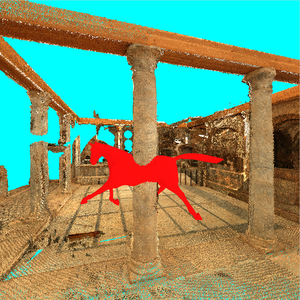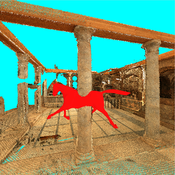Information
- Publication Type: Conference Paper
- Workgroup(s)/Project(s):
- Date: May 2014
- ISBN: 978-1-4822-6003-8
- Publisher: Canadian Information Processing Society
- Location: Montreal, Quebec, Canada
- Lecturer: Stefan Ohrhallinger
- ISSN: 0713-5424
- Event: Graphics Interface 2014
- Booktitle: Proceedings of the 2014 Graphics Interface Conference
- Conference date: 7. May 2014 – 9. May 2014
- Pages: 25 – 33
- Keywords: bounding volumes, layered depth images, collision detection, point cloud, dynamic
Abstract
A recent trend in interactive environments is the use of unstructured and temporally varying point clouds. This is driven by both affordable depth cameras and augmented reality simulations. One research question is how to perform collision detection on such point clouds. State-of-the-art methods for collision detection create a spatial hierarchy in order to capture dynamic point cloud surfaces, but they require O(NlogN) time for N points. We propose a novel screen-space representation for point clouds which exploits the property of the underlying surface being 2D. In order for dimensionality reduction, a 3D point cloud is converted into a series of thickened layered depth images. This data structure can be constructed in O(N) time and allows for fast surface queries due to its increased compactness and memory coherency. On top of that, parts of its construction come for free since they are already handled by the rendering pipeline. As an application we demonstrate online collision detection between dynamic point clouds. It shows superior accuracy when compared to other methods and robustness to sensor noise since uncertainty is hidden by the thickened boundary.Additional Files and Images
Weblinks
No further information available.BibTeX
@inproceedings{Radwan-2014-CDR,
title = "Efficient Collision Detection While Rendering Dynamic Point
Clouds",
author = "Mohamed Radwan and Stefan Ohrhallinger and Michael Wimmer",
year = "2014",
abstract = "A recent trend in interactive environments is the use of
unstructured and temporally varying point clouds. This is
driven by both affordable depth cameras and augmented
reality simulations. One research question is how to perform
collision detection on such point clouds. State-of-the-art
methods for collision detection create a spatial hierarchy
in order to capture dynamic point cloud surfaces, but they
require O(NlogN) time for N points. We propose a novel
screen-space representation for point clouds which exploits
the property of the underlying surface being 2D. In order
for dimensionality reduction, a 3D point cloud is converted
into a series of thickened layered depth images. This data
structure can be constructed in O(N) time and allows for
fast surface queries due to its increased compactness and
memory coherency. On top of that, parts of its construction
come for free since they are already handled by the
rendering pipeline. As an application we demonstrate online
collision detection between dynamic point clouds. It shows
superior accuracy when compared to other methods and
robustness to sensor noise since uncertainty is hidden by
the thickened boundary.",
month = may,
isbn = "978-1-4822-6003-8",
publisher = "Canadian Information Processing Society",
location = "Montreal, Quebec, Canada ",
issn = "0713-5424",
event = "Graphics Interface 2014",
booktitle = "Proceedings of the 2014 Graphics Interface Conference",
pages = "25--33",
keywords = "bounding volumes, layered depth images, collision detection,
point cloud, dynamic",
URL = "https://www.cg.tuwien.ac.at/research/publications/2014/Radwan-2014-CDR/",
}


 paper
paper slides
slides

